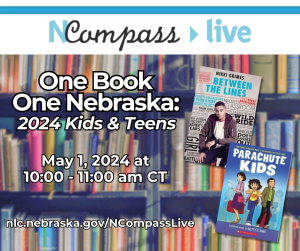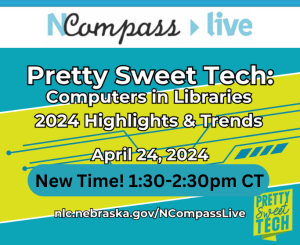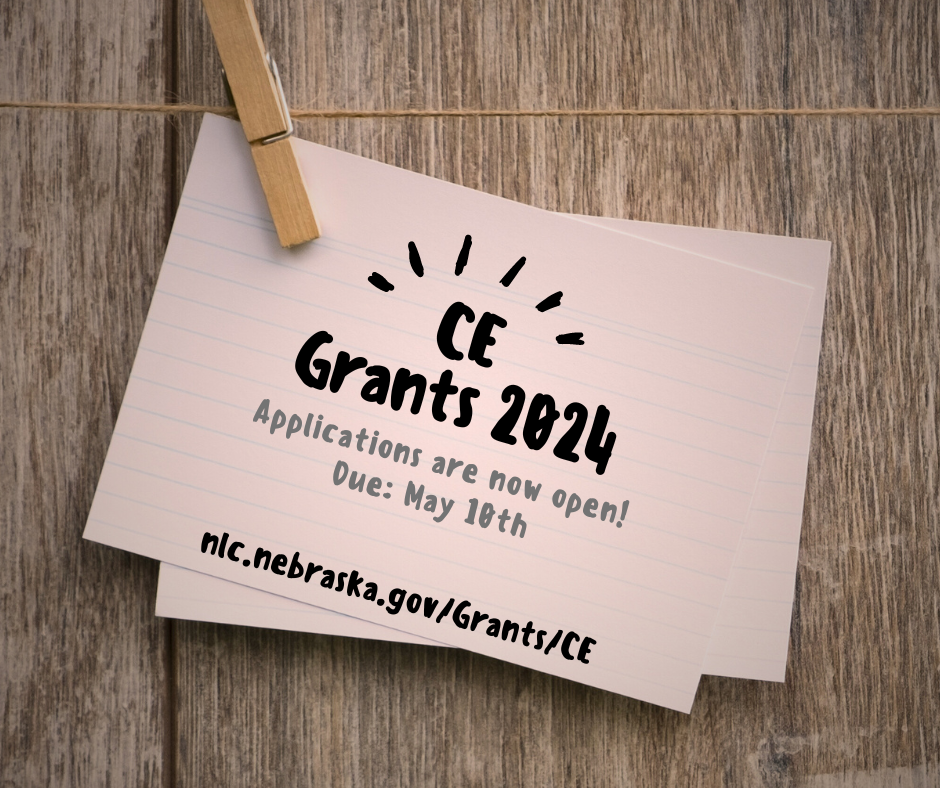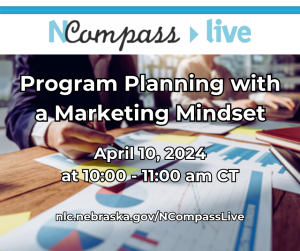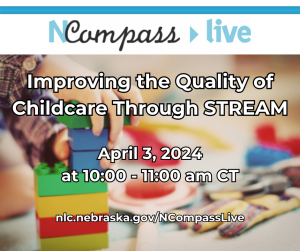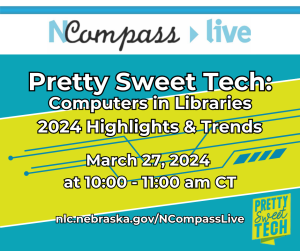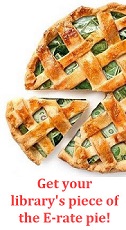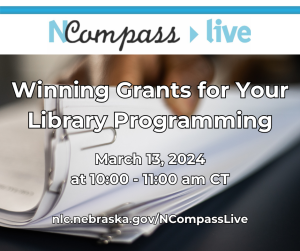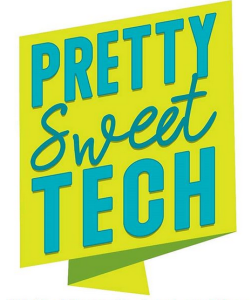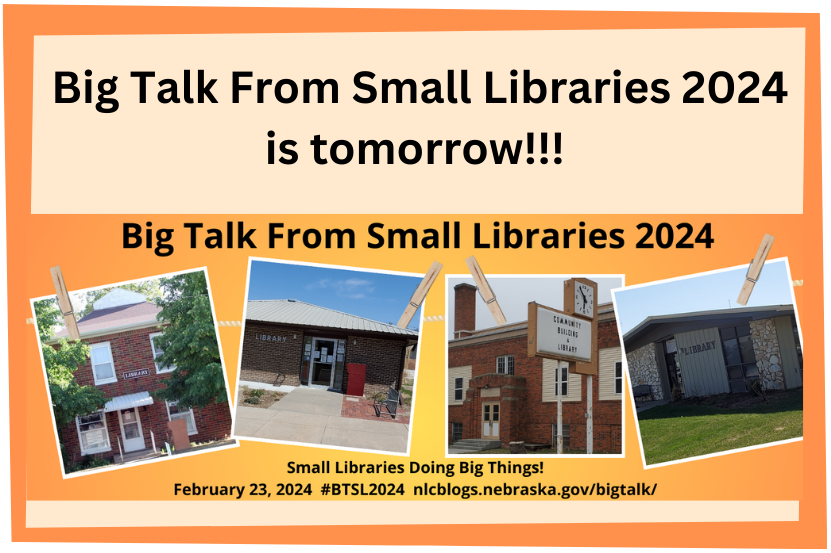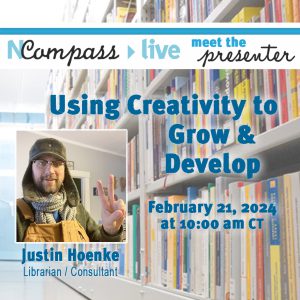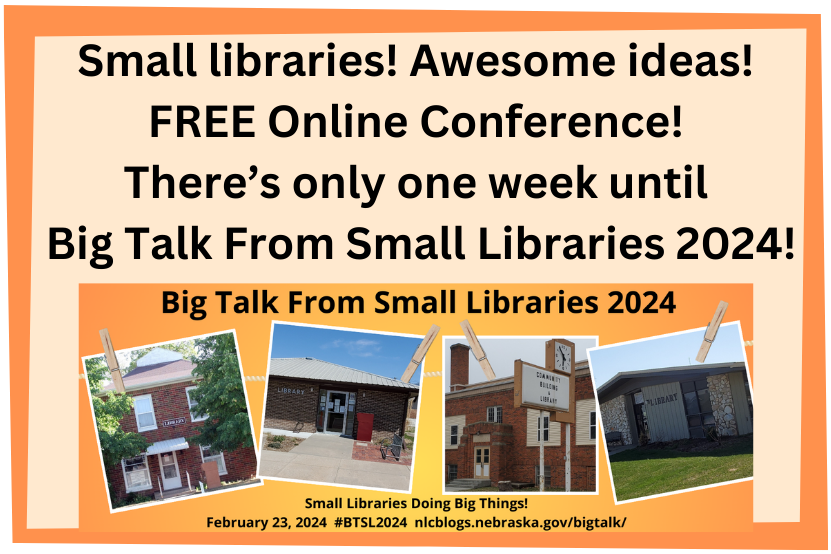Search the Blog
Categories
- Books & Reading
- Broadband Buzz
- Census
- Education & Training
- General
- Grants
- Information Resources
- Library Management
- Nebraska Center for the Book
- Nebraska Memories
- Now hiring @ your library
- Preservation
- Pretty Sweet Tech
- Programming
- Public Library Boards of Trustees
- Public Relations
- Talking Book & Braille Service (TBBS)
- Technology
- Uncategorized
- What's Up Doc / Govdocs
- Youth Services
Archives
Subscribe
Category Archives: Education & Training
NCompass Live: One Book for Nebraska Kids & Teens 2024
Wouldn’t it be great if kids all over Nebraska were talking about books? Hear about the Nebraska Library Commission & the Regional Library Systems’ program where kids can all read and discuss the same book on next week’s NCompass Live webinar on Wednesday, May 1 at 10am CT.
Join Sally Snyder, the NLC’s Coordinator of Children and Young Adult Library Services, and Aimee Owen, Information Services Librarian, to learn all about the One Book for Nebraska Kids and Teens program.
Our 2024 titles are: One Book For Nebraska Kids – Parachute Kids by Betty C. Tang, and One Book For Nebraska Teens – Between the Lines by Nikki Grimes.
Upcoming NCompass Live shows:
- May 8 – The 2024 Public Library Accreditation Process
- May 29 – Pretty Sweet Tech
To register for an NCompass Live show, or to listen to recordings of past shows, go to the NCompass Live webpage.
NCompass Live is broadcast live every Wednesday from 10am – 11am Central Time. Convert to your time zone on the Official U.S. Time website.
The show is presented online using the GoTo Webinar online meeting service. Before you attend a session, please see the NLC Online Sessions webpage for detailed information about GoTo Webinar, including system requirements, firewall permissions, and equipment requirements for computer speakers and microphones.
What’s Up Doc? New State Agency Publications at the Nebraska Library Commission
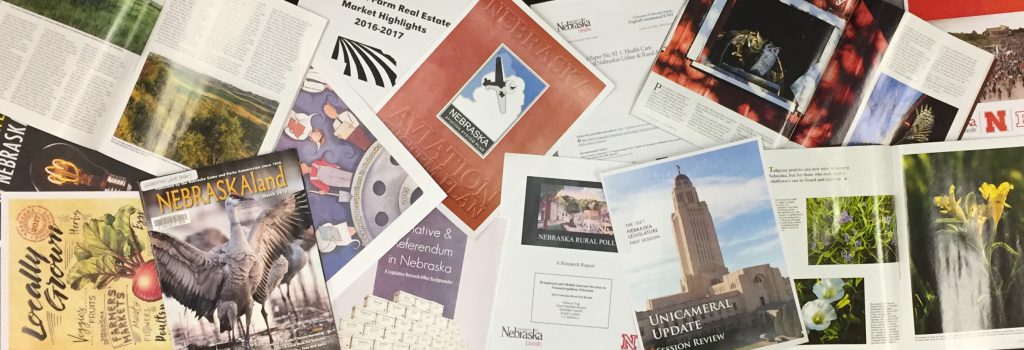
New state agency publications have been received at the Nebraska Library Commission for January and February, 2024. Included are reports from the Nebraska Bureau of Sociological Research, the Nebraska Foster Care Review Office, the Nebraska Department of Transportation, and the Nebraska Workers’ Compensation Court, to name a few.
Items are available for immediate viewing and printing by clicking directly in the .pdf below.
The Nebraska Legislature created the Nebraska Publications Clearinghouse in 1972 as a service of the Nebraska Library Commission. Its purpose is to collect, preserve, and provide access to all public information published by Nebraska state agencies. By law (State Statutes 51-411 to 51-413) all Nebraska state agencies are required to submit their published documents to the Clearinghouse. For more information, visit the Nebraska Publications Clearinghouse page, contact Mary Sauers, Government Information Services Librarian; or contact Bonnie Henzel, State Documents Staff Assistant.
Posted in Books & Reading, Education & Training, General, Information Resources, What's Up Doc / Govdocs
Tagged books, GovDocs, Reading
Leave a comment
NCompass Live: Pretty Sweet Tech: Computers in Libraries 2024 Highlights & Trends
Highlights and Trends from Computers in Libraries 2024 will be shared on next week’s ‘Pretty Sweet Tech’ NCompass Live webinar, on Wednesday, April 24 at 10am 1:30pm CT.
Special monthly episodes of NCompass Live! Join the NLC’s Technology Innovation Librarian, Amanda Sweet, as she guides us through the world of library-related Pretty Sweet Tech.
Computers in Libraries is the world’s leading technology and innovation conference for librarians! In this session I will cover come of the awesome ideas, tools, tips and tricks of the trade I picked up while in D.C. this year.
I hope to see you there! As a side note, if you’re looking for more emerging tech trends in the library, check out Computers in Libraries magazine.
Upcoming NCompass Live shows:
- May 1 – One Book for Nebraska Kids & Teens 2024
- May 8 – The 2024 Public Library Accreditation Process
To register for an NCompass Live show, or to listen to recordings of past shows, go to the NCompass Live webpage.
This week’s NCompass Live will be held from 1:30pm-2:30pm Central Time. Convert to your time zone on the Official U.S. Time website.
The show is presented online using the GoTo Webinar online meeting service. Before you attend a session, please see the NLC Online Sessions webpage for detailed information about GoTo Webinar, including system requirements, firewall permissions, and equipment requirements for computer speakers and microphones.
Posted in Education & Training, Pretty Sweet Tech, Technology
Tagged CILDC, NCompLive, prettysweettech
Leave a comment
Continuing Education & Training Grants: Applications Open!
Continuing Education & Training grants help assist Nebraska libraries to improve the library services provided to their communities through continuing education and training for their library personnel and supporters. Successful applications will show how the continuing education and/or training proposed will support the library’s mission.
For this second round of CE Grants, we are accepting applications in three different areas: taking an online course, attending an out-of-state professional conference, and other larger continuing education projects for library staff or library board members. These courses/events/projects must be after July 1st.
Continuing Education and Training Grants 2024
Applications and support forms are due May 10, 2024.
For more details about this and other NLC grants, the NCompass Live archived session “NLC Grants for 2024” is also available.
If you have any questions or would like more information, please contact Holli Duggan
NCompass Live: Program Planning with a Marketing Mindset
Learn how to do ‘Program Planning with a Marketing Mindset’ at your library on next week’s NCompass Live webinar on Wednesday, April 10 at 10am CT.
Libraries have been offering programming for decades, and in many cases the model has been, “Let’s plan a program, promote it, and see who shows up.” This approach hasn’t changed much, even with social and technological changes, not to mention the pandemic and streaming programs. Program planning with a marketing mindset starts with identifying your customer’s needs and wants, then developing programs and services to meet those needs and wants. We’ll discuss how to use research – quantitative and qualitative – to plan and market programs that will engage your customers. We’ll talk about “bundling” programs and services for different audience segments. We’ll also cover how this more strategic approach can save time and resources for your library.
Presenter: Cordelia Anderson, Library Marketing and Communications Consultant, Cordelia Anderson Consulting .
Upcoming NCompass Live shows:
- April 17 – 2024 One Book One Nebraska: Dancing with the Octopus
- April 24 – Pretty Sweet Tech: Computers in Libraries 2024 Highlights & Trends
To register for an NCompass Live show, or to listen to recordings of past shows, go to the NCompass Live webpage.
NCompass Live is broadcast live every Wednesday from 10am – 11am Central Time. Convert to your time zone on the Official U.S. Time website.
The show is presented online using the GoTo Webinar online meeting service. Before you attend a session, please see the NLC Online Sessions webpage for detailed information about GoTo Webinar, including system requirements, firewall permissions, and equipment requirements for computer speakers and microphones.
Posted in Education & Training, Library Management, Programming, Public Relations
Tagged NCompLive
Leave a comment
United for Libraries Learning Live: A Practical Guide to Evaluating Your Library Director
All Nebraska public libraries are members of United for Libraries through the Statewide Group Membership purchased by the Nebraska Library Commission. The Commission provides this membership to ensure that public library staff members, Friends, Trustees, and Foundations can take advantage of United for Libraries’ services to enhance fundraising, advocacy, and public awareness.
A Practical Guide to Evaluating Your Library Director
Tuesday, April 9th, 1:00 PM (CST)
“Part of a Trustee’s responsibility is to evaluate the library director, yet many organizations do not have an annual review procedure in place. During this Learning Live, library Trustees will acquire the tools needed to conduct an annual evaluation. This session is designed with the understanding that many Trustees do not have HR experience. We’ll offer practical strategies and tools to effectively assess the performance of library directors, with insight from a variety of library stakeholders. Trustees will gain the knowledge and confidence they need to conduct meaningful evaluations of their library directors. Especially when things are going well!”
Statewide Group Members receive FREE registration for the live webinars and on-demand access for the duration of the active statewide group membership. These “Learning Live” sessions are recorded and can be accessed through the United for Libraries eLearning course.
For more information about previous sessions, please visit: Previous “Learning Live” Sessions
NCompass Live: Improving the Quality of Childcare Through STREAM
Discover new and exciting ways to make learning fun with interactive S.T.R.E.A.M. program boxes on next week’s NCompass Live webinar, on Wednesday, April 3 at 10am CT.
Joanne Neemann, Director, Beatrice (NE) Public Library is joining us to talk about the library’s S.T.R.E.A.M. program boxes. With each themed activity box, students will have the opportunity to engage their minds and creativity on a multi-faceted journey exploring the Science, Technology, Reading, Engineering, Art, and Math of a chosen topic.
Upcoming NCompass Live shows:
- April 10 – Program Planning with a Marketing Mindset
- April 17 – 2024 One Book One Nebraska: Dancing with the Octopus
- April 24 – Pretty Sweet Tech: Computers in Libraries 2024 Highlights & Trends
To register for an NCompass Live show, or to listen to recordings of past shows, go to the NCompass Live webpage.
NCompass Live is broadcast live every Wednesday from 10am – 11am Central Time. Convert to your time zone on the Official U.S. Time website.
The show is presented online using the GoTo Webinar online meeting service. Before you attend a session, please see the NLC Online Sessions webpage for detailed information about GoTo Webinar, including system requirements, firewall permissions, and equipment requirements for computer speakers and microphones.
NCompass Live: Pretty Sweet Tech: Computers in Libraries 2024 Highlights & Trends
Highlights and Trends from Computers in Libraries 2024 will be shared on next week’s ‘Pretty Sweet Tech’ NCompass Live webinar, on Wednesday, March 27 at 10am CT.
Special monthly episodes of NCompass Live! Join the NLC’s Technology Innovation Librarian, Amanda Sweet, as she guides us through the world of library-related Pretty Sweet Tech.
Computers in Libraries is the world’s leading technology and innovation conference for librarians! In this session I will cover come of the awesome ideas, tools, tips and tricks of the trade I picked up while in D.C. this year.
I hope to see you there! As a side note, if you’re looking for more emerging tech trends in the library, check out Computers in Libraries magazine.
Upcoming NCompass Live shows:
- April 3 – Improving the Quality of Childcare Through STREAM
- April 10 – Program Planning with a Marketing Mindset
To register for an NCompass Live show, or to listen to recordings of past shows, go to the NCompass Live webpage.
NCompass Live is broadcast live every Wednesday from 10am – 11am Central Time. Convert to your time zone on the Official U.S. Time website.
The show is presented online using the GoTo Webinar online meeting service. Before you attend a session, please see the NLC Online Sessions webpage for detailed information about GoTo Webinar, including system requirements, firewall permissions, and equipment requirements for computer speakers and microphones.
Posted in Education & Training, Pretty Sweet Tech, Technology
Tagged CILDC, NCompLive, prettysweettech
Leave a comment
E-rate Form 471 Deadline: Two weeks left to file for FY 2024
The deadline to submit the second form in the E-rate process, Form 471, for Funding Year 2024 is Wednesday, March 27. The application filing window for Form 471 opened on January 17.
However, we do not recommend waiting until the last day to submit your Form 471! If there are any issues that day, like the E-rate servers are slowed down because it is the last day to submit, or you can’t submit the form due to reasons on your end, such as illness, weather, power outage, etc., then you could miss the deadline and lose out on E-rate altogether.
So, log into your E-rate Productivity Center (EPC) account and submit your Form 471 as soon as you are allowed!
IMPORTANT: Before you file your Form 471, check your Form 470 Receipt Notification for your Allowable Contract Date – the first date you are allowed to submit your 471. Do not submit your 471 before that date! Remember, after you submit your Form 470, you must wait 28 days to submit your Form 471. You can find your Notification within the EPC portal in your News feed.
Do you need help completing your forms? Do you have questions about E-rate? You’re in luck!
Today’s E-rate News Brief has last-minute tips and links to instructional videos. USAC also conducted a series of webinars focused on E-Rate topics related to FCC Forms 470 and 471 – you can watch the recordings on the USAC Webinars webpage. To keep up on E-rate news, subscribe to the USAC E-rate News Brief.
USAC has a series of video tutorials on the FCC Form 471 at: https://www.usac.org/e-rate/learn/videos/#FCC-Form-471
And more recorded webinars, demos, and training materials are available on the NLC E-rate webpage.
If you have any questions or need any assistance with your E-rate forms, please contact the State E-rate Coordinator for Public Libraries in Nebraska, Christa Porter, 800-307-2665, 402-471-3107.
NCompass Live: Winning Grants for Your Library Programming
While every library is unique, they all seem to share one thing in common: they could use more money! Get tips for ‘Winning Grants for Your Library Programming’ on next week’s NCompass Live webinar on Wednesday, March 13, at 10am CT.
Grant funding might be the just thing to help buy technology for STEM programming, get a new service initiative off the ground, or complete a renovation. But applying for grants can be overwhelming – and that’s assuming you can even find one for which you qualify. This session aims to introduce you to the tools to make the grant application process more easily navigable. In this session, Kathryn will provide tips for putting your best foot forward when it comes time to submit your proposal. Handouts include a roadmap to success and descriptions of various sections of the application.
Presenter: Kathryn Brockmeier, Grant Consultant.
Upcoming NCompass Live shows:
- March 20 – No More Summertime Blues: Shaking Up SRP to Make It Work for YOU!
- March 27 – Pretty Sweet Tech: Computers in Libraries 2024 Highlights & Trends
- April 3 – Improving the Quality of Childcare Through STREAM
- April 10 – Program Planning with a Marketing Mindset
To register for an NCompass Live show, or to listen to recordings of past shows, go to the NCompass Live webpage.
NCompass Live is broadcast live every Wednesday from 10am – 11am Central Time. Convert to your time zone on the Official U.S. Time website.
The show is presented online using the GoTo Webinar online meeting service. Before you attend a session, please see the NLC Online Sessions webpage for detailed information about GoTo Webinar, including system requirements, firewall permissions, and equipment requirements for computer speakers and microphones.
United for Libraries Learning Live: Media and Crisis Communications for Trustees & Friends
All Nebraska public libraries are members of United for Libraries through the Statewide Group Membership purchased by the Nebraska Library Commission. The Commission provides this membership to ensure that public library staff members, Friends, Trustees, and Foundations can take advantage of United for Libraries’ services to enhance fundraising, advocacy, and public awareness.
United for Libraries Learning Live: Media and Crisis Communications for Trustees & Friends
Tuesday, March 12, 1:00 PM (CST)
“Is your library’s Board of Trustees and/or Friends of the Library group prepared for a crisis? How can you support your library’s communications policies and procedures? This session, presented by longtime senior communications and marketing executive Kathleen McEvoy, will go over how to develop a solid communication plan, what to know about working with the media, tips on communicating the library’s value, how to respond to inquiries about book bans/censorship, and more. This program will offer tips for board members and Friends, as well as those who work with them.”
Statewide Group Members receive FREE registration for the live webinars and on-demand access for the duration of the active statewide group membership. These “Learning Live” sessions are recorded and can be accessed through the United for Libraries eLearning course.
For more information about previous sessions, please visit: Previous “Learning Live” Sessions
Big Talk From Small Libraries Presentation Rescheduled
Good News! We have a new date for the Big Talk From Small Libraries 2024 presentation that was canceled at the last minute, “No More Summertime Blues: Shaking Up SRP to Make It Work For YOU!”.
Chelsea Price has graciously agreed to do their presentation on March 20 on NCompass Live from 10-11am Central Time. This is the Nebraska Library Commission’s weekly webinar series. The presentation will be recorded if you are unable to watch it at the scheduled time.
This was one of the 10 minute Lightning Round sessions for the conference, but will be expanded to fit the longer, hour-long, NCompass Live format.
You can register for this new date at No More Summertime Blues: Shaking Up SRP to Make It Work For YOU!.
NCompass Live: Pretty Sweet Tech: Evolve Project: Shaping the Libraries of the Future
Brian Pichman of the Evolve Project will be Amanda’s guest on next week’s NCompass Live webinar on Wednesday, February 28, at 10am CT.
Special monthly episodes of NCompass Live! Join the NLC’s Technology Innovation Librarian, Amanda Sweet, as she guides us through the world of library-related Pretty Sweet Tech.
Brian Pichman of the Evolve Project is the man behind the scenes, transforming how libraries engage with technology. Here at the Commission, he helped a lot with the Tech Kits Through the Mail. If you’ve gotten a kit from us, it’s because he tracks tech trends, works with tech gadget startups, and helps build solid strategies to connect communities with transformative technology.
Honestly, he’s helped me a lot over the years. But I can’t be selfish. I decided to share his expertise with you all! Turns out Brian does way more than I ever knew possible.
In this session we will get Brian talking about all the cool things he has going on:
- Explore how his pilot programs of new games & gadgets are shaping the future of libraries through makerspaces, innovation spaces, and leading edge programming
- Learn how Brian helps libraries embrace AI, VR and AR to revolutionize library services and enhance accessibility and engagement for all.
- Discover his passion for open-source solutions to drive positive change, and his recent endeavors with ByWater Solutions, a leading provider of open-source library software.
- Dig into his work with libchalk, a web hosting platform designed specifically to help libraries host digital content, websites, courses, and online resource libraries.
The real question is, what doesn’t he do? He can help your library too. Find out how.
Upcoming NCompass Live shows:
- March 13 – Winning Grants for Your Library Programming
- March 27 – Pretty Sweet Tech
- April 3 – Improving the Quality of Childcare Through STREAM
To register for an NCompass Live show, or to listen to recordings of past shows, go to the NCompass Live webpage.
NCompass Live is broadcast live every Wednesday from 10am – 11am Central Time. Convert to your time zone on the Official U.S. Time website.
The show is presented online using the GoTo Webinar online meeting service. Before you attend a session, please see the NLC Online Sessions webpage for detailed information about GoTo Webinar, including system requirements, firewall permissions, and equipment requirements for computer speakers and microphones.
Posted in Education & Training, Pretty Sweet Tech, Technology
Tagged NCompLive, prettysweettech
Leave a comment
Big Talk From Small Libraries 2024 is tomorrow!
Small libraries! Awesome ideas! FREE!
Join us tomorrow for the 2024 Big Talk From Small Libraries online conference. Registration is still open, so head over to the Registration page and sign up!
We have a full agenda for the day, with speakers from academic and public libraries presenting on a wide variety of topics: fundraising, Memory Cafes, summer reading, accessibility audits, afterschool meals programs, DEIB: diversity, equity, inclusion, and belonging, and much more.
This event is a great opportunity to learn about the innovative things your colleagues are doing in their small libraries.
And, Nebraska library staff and board members can earn 1 hour of CE Credit for each hour of the conference you attend! A special Big Talk From Small Libraries CE Report form has been made available for you to submit your C.E. credits.
So, come join us for a day of big ideas from small libraries!
NCompass Live: Using Creativity to Grow & Develop
On next week’s NCompass Live, Justin Hoenke shares his experiences moving from the super creative world of youth services in libraries to the still creative but not the same kind of creative world of leading a library.
Sign up to join us for ‘Using Creativity to Grow & Develop’ on Wednesday, February 21, at 10am CT.
Justin discusses the pros and cons of moving into leadership and managing teams and how to use your creativity to engage your team and community.
About the Presenter: Justin Hoenke is a human being and a librarian. He’s worked in public libraries in the USA and New Zealand, and is currently looking for his next work-related adventure in life. His professional interests include creativity, youth services, public libraries as community centers, and content creation. He offers library consultancy services for public libraries and can be contacted at https://justinthelibrarian.com/
Upcoming NCompass Live shows:
- Feb. 28 – Pretty Sweet Tech: Evolve Project: Shaping the Libraries of the Future
- March 13 – Winning Grants for Your Library Programming
- March 27 – Pretty Sweet Tech
To register for an NCompass Live show, or to listen to recordings of past shows, go to the NCompass Live webpage.
NCompass Live is broadcast live every Wednesday from 10am – 11am Central Time. Convert to your time zone on the Official U.S. Time website.
The show is presented online using the GoTo Webinar online meeting service. Before you attend a session, please see the NLC Online Sessions webpage for detailed information about GoTo Webinar, including system requirements, firewall permissions, and equipment requirements for computer speakers and microphones.
Only One Week Until Big Talk From Small Libraries 2024!
Small libraries! Awesome ideas! FREE Online Conference!
There’s only one week until Big Talk From Small Libraries 2024!
Check out the full schedule and register to join us next Friday, February 23.
Sponsored by the Nebraska Library Commission and the Association for Rural & Small Libraries (ARSL), this free one-day online conference is tailored for staff from small libraries – the smaller the better! Each of our speakers is from a small library serving fewer than 10,000 people. This event is a great opportunity to learn about the innovative things your colleagues are doing in their small libraries.
Everyone is welcome to register and attend, regardless of how big or small your library. But, if your library serves a few hundred to a few thousand people, this is the day for you!
Posted in Education & Training, Library Management, Programming, Public Relations, Technology, Youth Services
Tagged ARSL, BTSL2024
Leave a comment
Computers in Libraries 2024 (March 12- March 14)
I do an overview session of the Computers in Libraries (CIL) conference every year on NCompass Live sharing all the latest trends, tools, and techy tips. This year I remembered to tell you about the conference ahead of time! If you’re wondering, CIL is a magical time of year where libraries come together to talk about all things technology.
This year (March 12-14) there are tons of sessions on AI in the library, website re-design, next-level makerspaces, building knowledge hubs, cybersecurity, creative partnerships, tech for marketing, innovation spaces, and everything your techy little heart desires. It’s my happy place. I’ll also be doing two sessions and a workshop if you’re interested.
The Nebraska Library Commission offers discounted rates for CIL registration. If it’s not in the cards for you this year, tune into my NCompass overview session on April 24, 2024. Or do both, it’s hard to catch everything.
Learn more about the Computers in Libraries Conference, or register on their website. It’s always in Crystal City, VA, a short train ride from the Smithsonian museums and all the attractions in D.C. if you want to multitask. Remember to grab the Commission’s discount code first!
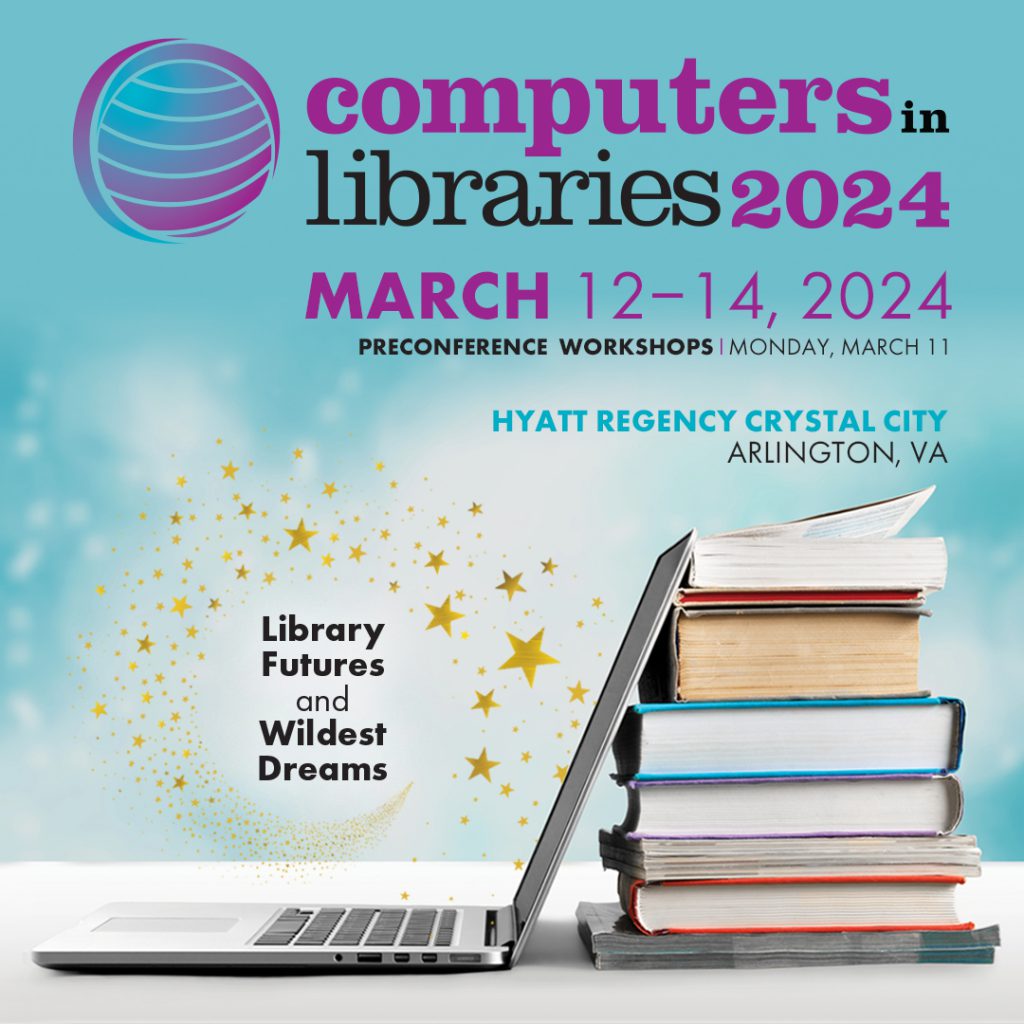
United for Libraries Learning Live: Ask the Experts: Boards of Trustees, Friends Groups, and Foundations
All Nebraska public libraries are members of United for Libraries through the Statewide Group Membership purchased by the Nebraska Library Commission. The Commission provides this membership to ensure that public library staff members, Friends, Trustees, and Foundations can take advantage of United for Libraries’ services to enhance fundraising, advocacy, and public awareness.
Tues., Feb. 13, 1:00 PM (CST)
“A panel of experts will address common issues that arise among library Boards, Friends groups, and Foundations, and how to solve them. Featured panelists will be Brenda Langstraat Bui, President & CEO, Chicago Public Library Foundation; Nicolle Davies, Colorado State Librarian, and Dr. Andrew Smith, Associate Professor, School of Library and Information Management at Emporia State University in Kansas, and past chair of the Emporia Public Library. Each panelist will present an in-depth scenario and provide tips and best practices. During a “lightning round” session, speakers will field questions from attendees.”
Statewide Group Members receive FREE registration for the live webinars and on-demand access for the duration of the active statewide group membership. These “Learning Live” sessions are recorded and can be accessed through the United for Libraries eLearning course.
For more information, please visit: Previous “Learning Live” Sessions
NCompass Live: WiFi in the Library

Do you have WiFi questions? Sherm has the answers! Join him to learn all about ‘WiFi in the Library’ on next week’s NCompass Live webinar on Wednesday, February 7, at 10am CT.
On this episode on NCompass Live, the Nebraska Library Commission’s Library Technology Support Specialist, Andrew ‘Sherm’ Sherman, will cover:
- The current standards of WiFi technology
- What WiFi standards and equipment libraries should be utilizing
- The pros and cons of the different WiFi configurations in a library environment
- The assistance Sherm can provide to libraries with their WiFi and other technology needs
Upcoming NCompass Live shows:
- Feb. 14 – ConnectEd Nebraska: Bridging the Digital Divide through Innovative eduroam Expansion
- Feb. 21 – Using Creativity to Grow & Develop
- Feb. 28 – Pretty Sweet Tech
To register for an NCompass Live show, or to listen to recordings of past shows, go to the NCompass Live webpage.
NCompass Live is broadcast live every Wednesday from 10am – 11am Central Time. Convert to your time zone on the Official U.S. Time website.
The show is presented online using the GoTo Webinar online meeting service. Before you attend a session, please see the NLC Online Sessions webpage for detailed information about GoTo Webinar, including system requirements, firewall permissions, and equipment requirements for computer speakers and microphones.
#BookFaceFriday “Rez Ball” by Byron Graves
This #BookFaceFriday is a slam dunk!
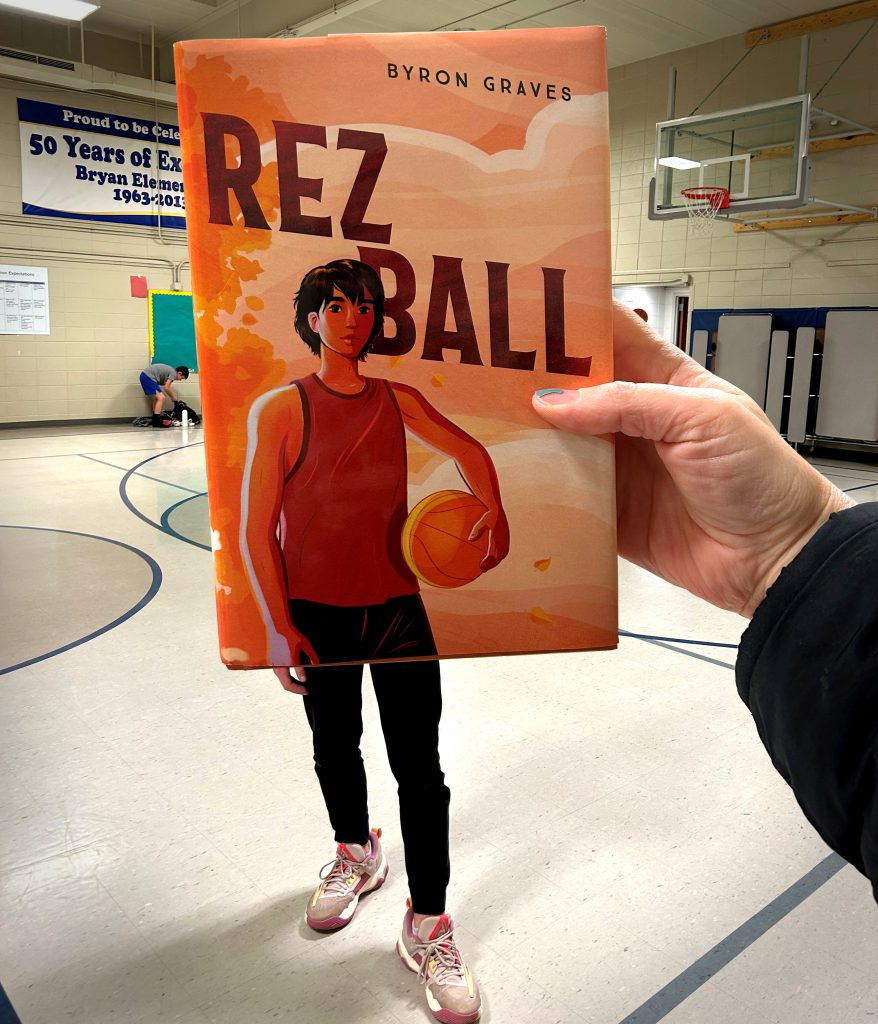
Get your game face on, because it’s #BookFaceFriday! If you’re interested in staying up-to-date on the latest and greatest in young adult books, check out this week’s episode of NCompass Live, Best New Teen Reads of 2023, presented by NLC’s Coordinator of Children and Young Adult Library Services, Sally Snyder, and Fremont High School librarian, Dana Fontaine. Today’s #BookFace selection, “Rez Ball” by Byron Graves (Heartdrum, 2023), was one of the titles featured in Sally’s teen list. Sally does two presentations like this each year on NCompass Live, one on YA books and another on children’s books. “Rez Ball” is a William C. Morris Debut Book Award winner and an American Indian Library Association Youth Literature Award winner. You can find it as both an eBook and audiobook in Nebraska OverDrive Libraries. If you’re looking for more information about NCompass Live or Sally Snyder’s Best Books lists, check out the NCompass Live Archive.
“Debut author Graves, who is Ojibwe like Tre, doesn’t shirk from showing his community’s ugly experiences, but he never languishes in them. Well-paced and exciting—the action of the basketball games is exceptionally well written—this is a solid piece of sports fiction.”
— Booklist
Find this title and many more through Nebraska OverDrive! Libraries participating in the Nebraska OverDrive Libraries Group currently have access to a shared and growing collection of digital downloadable audiobooks and eBooks. 194 libraries across the state share the Nebraska OverDrive collection of 26,174 audiobooks, 36,611 ebooks, and 5,210 magazines. As an added bonus it includes 130 podcasts that are always available with simultaneous use (SU), as well as SU ebooks and audiobook titles that publishers have made available for a limited time. If you’re a part of it, let your users know about this great title, and if you’re not a member yet, find more information about participating in Nebraska Overdrive Libraries!
Love this #BookFace & reading? Check out our past #BookFaceFriday photos on the Nebraska Library Commission’s Facebook page!
